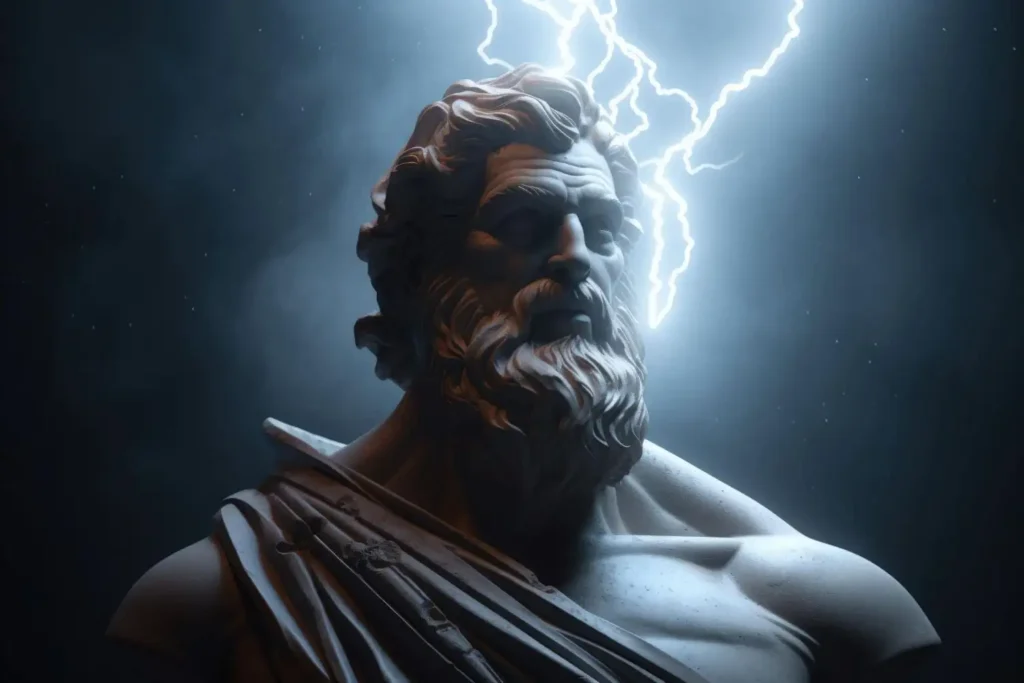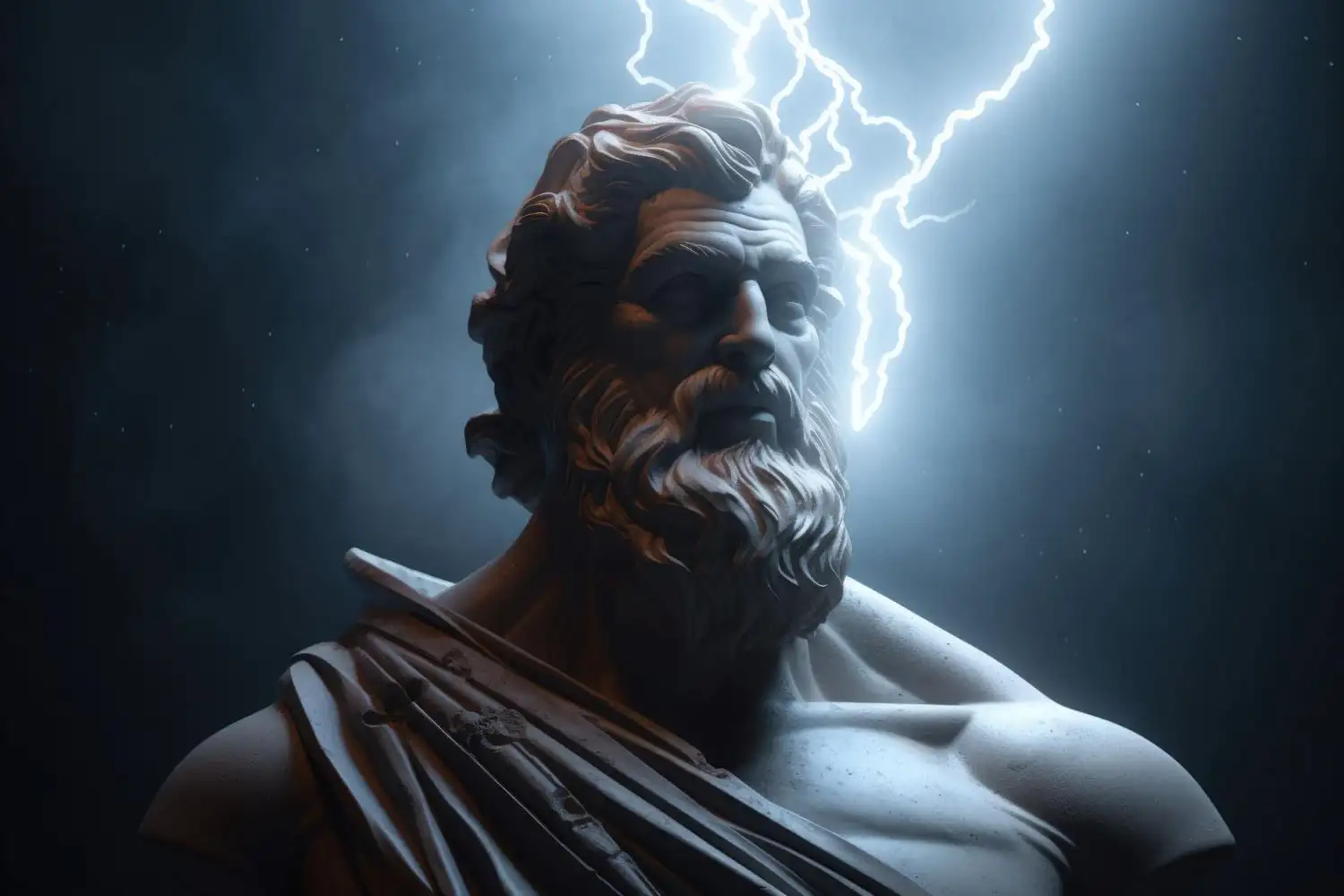One of the most powerful and influential figures in greek god in mythology is Zeus god of thunder and the king of the gods. Zeus is a figure deeply entrenched in mythology and revered by ancient Greeks. This article will explore the origins of Zeus, delve into each phase of his life, shedding light on the captivating tales that surround him and ultimately provide a comprehensive understanding of this mighty deity.
Table of Contents
Origins of Zeus in Greek Mythology

Zeus, also known as Jupiter to the Romans, was the son of Cronus and Rhea. According to ancient Greek mythology, Cronus was a titan who ruled over the universe before the gods took their place. Cronus had been warned by Gaia and Uranus that one of his own children would overthrow him. Fearful of a prophecy, he swallowed each of his offspring as they were born. However, Rhea managed to save Zeus by hiding him on the island of Crete. Raised in secrecy under the care of nymphs and was raised as a mortal, Zeus grew in strength and wisdom, preparing himself for the day he would challenge his father’s rule.
Childhood and Ascendance
Zeus upbringing on Crete allowed him to develop his powers and become a formidable force. As Zeus matured, he devised a plan to free his siblings from their father’s grasp. He returned to Mount Olympus, the home of the gods, to confront his father Cronus. With the help of his mother, Rhea, Zeus tricked Cronus into regurgitating his swallowed siblings. United once again, Zeus and his brothers and sisters, known as the Olympians, waged war against the Titans. After a fierce battle that lasted ten years, the Olympians emerged victorious, and Zeus became the ruler of the heavens, the king of the gods.
Zeus God of Thunder Reign as King of the Gods
With his newfound power, Zeus presided over Mount Olympus, the divine dwelling place of the gods. As king of the gods, he maintained order and justice throughout the cosmos. Zeus possessed an unrivaled authority that extended to both mortals and immortals alike.
As the king of the gods, Zeus possessed immense power and had control over various aspects of nature. He was known as the greek god of the sky and thunder, wielding a lightning bolt as his weapon. Zeus was also associated with the sky, rain, clouds, and storms. His power extended beyond nature, as he was also considered the god of law and order, protecting justice and punishing those who violated it.
One of the most significant challenges Zeus faced as a king of gods came from Typhon, a monstrous creature born from Gaia to avenge the Titans’ defeat. Typhon was a formidable opponent, with a hundred dragon heads sprouting from his shoulders and emitting fire. In their battle for supremacy, Zeus god of thunder unleashed his thunderbolts to defeat Typhon and bury him under Mount Etna. Although Typhon was defeated, this encounter showcased Zeus’ strength and determination to protect his throne.
Relationships and Progeny
Zeus’ love affairs were legendary, resulting in numerous offspring with both goddesses and mortal women. His most famous union was when zeus married his sister Hera, who became his first wife and queen. Together, they had several children, including Ares (the god of war), Hephaestus (the god of fire), and Hebe (the goddess of youth).
However, Zeus was known for his infidelity, engaging in affairs with goddesses resulting in the birth of gods such as Apollo, Artemis, Hermes, Dionysus, and Athena. He also had numerous relationships with mortal women. These relationships led to the birth of many renowned figures, including Hercules, Perseus, and Helen of Troy.
Influence and Worship
Zeus’ influence extended far beyond Greek world of mythology itself. His image has been immortalized in countless works of art, literature, and popular culture throughout history. His story has inspired many subsequent myths and legends and continues to captivate people’s imaginations around the world.
Zeus was worshipped throughout ancient Greece, with temple of Zeus, dedicated by his name. The Olympic Games, held every four years, were held in his honor. These games were a testament to the strength and skill that Zeus embodied. The ancient Greeks believed that by participating in these games, they were paying homage to their beloved god.
Conclusion
Zeus god of thunder continues to captivate the imagination even in modern times. His epic battles, powerful alliances, and complex relationships have made him an enduring figure in Greek mythology. From his humble origins on Crete to his ascendance as king of the gods, Zeus embodies the triumph of good over evil. As we explore the rich tapestry of Greek mythology, we cannot overlook the indomitable presence of Zeus, forever etching his name in the annals of history.
In conclusion, Zeus remains an omnipotent deity whose legacy lives on in our collective consciousness. Whether as a ruler, a lover, or a warrior, Zeus’ impact on Greek mythology cannot be overstated. His story serves as a reminder of the power of determination and the ability to overcome even the greatest obstacles. His legacy continues to be celebrated today as we explore the rich tapestry of Greek mythology and its enduring impact on human culture.


